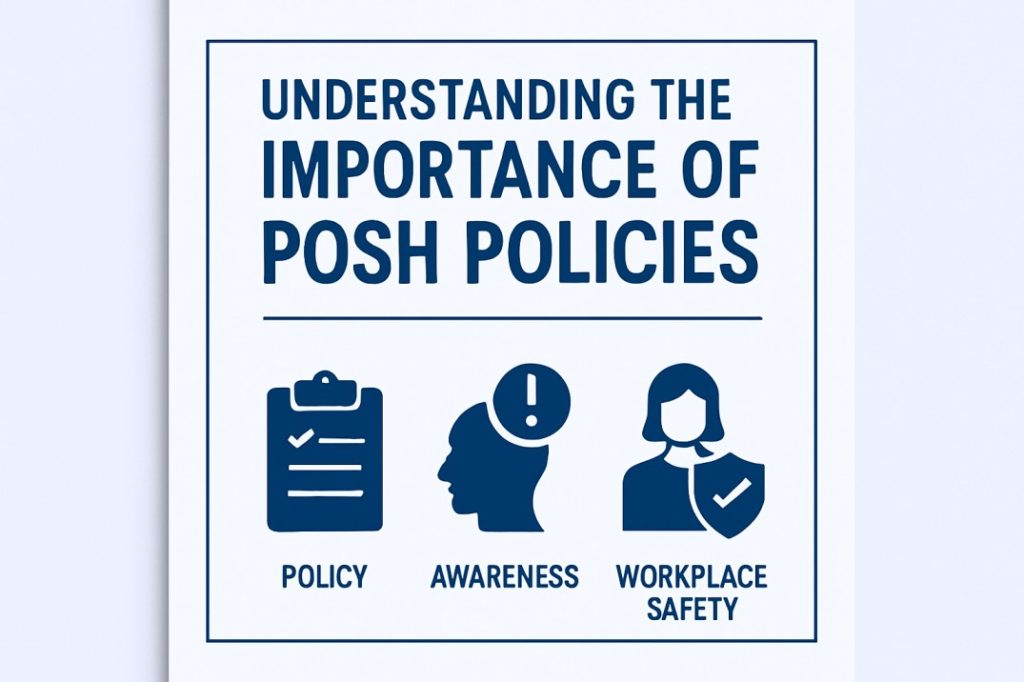POSH (Prevention of Sexual Harassment) policies are critical for creating a safe, respectful, and professional environment in any organization. By implementing the best practices for POSH policies, you not only comply with legal requirements but also foster an inclusive culture that values dignity and equality. In this blog, we will outline the essential practices for effectively implementing POSH policies in your organization.
Understanding the Importance of POSH Policies
POSH policies are more than just a legal obligation – they play a significant role in shaping the organizational culture. Implementing clear and robust POSH policies helps prevent sexual harassment, provides a framework for handling complaints, and promotes a respectful work environment. With a well-structured POSH policy, your organization demonstrates its commitment to employee safety and equality.
Why POSH Policies Matter
- Legal Compliance: POSH policies ensure compliance with government regulations, avoiding penalties and legal issues.
- Workplace Safety: They create a safe environment where employees can focus on their work without fear of harassment.
- Improved Productivity: A harassment-free workplace boosts morale, leading to increased productivity and better employee retention.
Key Practices for Effective POSH Implementation
Implementing a POSH policy requires a strategic approach. These best practices will guide you in developing and executing a comprehensive POSH framework that meets your organization’s needs:
1. Clearly Define the Policy
The first step in implementing a POSH policy is creating a clear, written document that outlines acceptable behavior and the consequences of harassment. The policy should include:
- Scope of the Policy: Clearly define what constitutes sexual harassment, including verbal, physical, and visual harassment.
- Complaint Procedure: Provide a step-by-step guide for employees to report harassment confidentially.
- Disciplinary Measures: Specify the potential consequences for violating the policy to discourage inappropriate behavior.
2. Train Employees Regularly
Training is a vital part of implementing POSH policies. Regular, interactive training sessions will ensure that all employees, including managers and leaders, are aware of the policy and how to act if an issue arises. Key areas to cover in training include:
- Understanding Harassment: Teach employees to recognize and understand various forms of harassment.
- Bystander Training: Encourage employees to intervene or report harassment when they witness it.
- Complaint Process: Explain how employees can report harassment and what steps will be taken following a complaint.
Building Comprehensive Training Ecosystems for POSH Compliance
Organizations can strengthen their POSH policy implementation by supplementing their harassment prevention programs with Paradiso Solutions’ extensive course catalog, featuring 100+ ready-made eLearning courses across 25+ key areas including diversity and inclusion, business ethics, leadership development, and workplace safety. This comprehensive approach enables organizations to build a holistic compliance framework that reinforces POSH objectives through multiple interconnected learning modules.
Such integrated training ecosystems ensure that POSH policies don’t exist in isolation but become part of a broader organizational commitment to respectful workplace practices and comprehensive compliance.
Prevention of Sexual Harassment (POSH) Training
Foster a safe and respectful workplace. Learn legal guidelines, real-life scenarios, and effective strategies to identify, prevent, and address sexual harassment at work.
3. Establish a Safe Reporting Mechanism
Employees should feel comfortable coming forward if they experience harassment. To ensure confidentiality and minimize retaliation, organizations must set up a reliable and anonymous reporting system. This could include:
- Anonymous Helpline: An anonymous phone line or email service that allows employees to report harassment safely.
- Third-Party Services: Consider using external agencies to handle complaints impartially.
- Regular Follow-ups: Conduct regular follow-ups to ensure employees are comfortable and the issue is addressed.
4. Encourage Leadership Involvement
Leaders play a crucial role in fostering a culture of respect and equality. Management should set an example by adhering to the POSH policy and taking harassment complaints seriously. Leadership involvement should include:
- Visible Commitment: Leaders should publicly commit to a harassment-free workplace.
- Active Participation in Training: Leaders should attend training sessions to show support and ensure they understand the policy.
- Transparency: Ensure that leadership acts transparently when dealing with harassment cases, demonstrating fairness and accountability.
5. Foster a Culture of Respect and Inclusion
POSH policies should be part of a broader strategy to promote diversity, equality, and inclusion within the workplace. To create a culture that values respect and inclusivity, organizations should:
- Promote Open Dialogue: Create an environment where employees feel comfortable discussing diversity, inclusion, and harassment-related issues.
- Celebrate Diversity: Implement programs that celebrate diversity and create an inclusive work environment.
- Regular Feedback: Encourage feedback from employees to identify areas for improvement and reinforce the importance of respectful behavior.
Discover how our courses can align with your training goals and drive real results.
Learning Built Around Your Goals.
Schedule A DemoMonitoring and Reviewing the Policy
Regularly reviewing your POSH policy ensures that it remains effective and relevant. Monitoring should include:
- Employee Surveys: Conduct regular surveys to assess employees’ understanding of the policy and their comfort with the reporting process.
- Policy Audits: Perform regular audits to ensure that the policy is being implemented consistently across the organization.
- Feedback Loops: Implement feedback loops to improve the policy based on employee experiences and concerns.
Supporting POSH Policy Implementation with CogniSpark AI
Effective POSH policy implementation goes beyond documentation—it requires ongoing training, awareness, and accessibility. CogniSpark AI helps organizations bring their policies to life with customizable, SCORM-compatible training modules that reflect internal guidelines and real-world scenarios.
Its AI-powered Authoring Tool allows HR teams to simplify legal terms and localize content, while the AI Tutor offers real-time support—answering questions and clarifying concepts during training. With multilingual support, leadership-specific modules, and easy LMS integration, CogniSpark ensures that POSH policies are not just communicated—but understood and embraced.
Conclusion
Implementing POSH policies is a crucial step in creating a respectful and safe working environment. By following these best practices, your organization can foster a culture of respect, compliance, and inclusivity. Remember, POSH policies are not just a legal requirement but a commitment to ensuring that all employees feel valued and safe at work.
Explore Our eLearning Course Catalog
Access 100+ of fully editable, SCORM-compatible courses featuring an integrated AI Tutor. Seamlessly compatible with any LMS, these courses are designed to elevate your training programs.
Explore Course Catalog






















